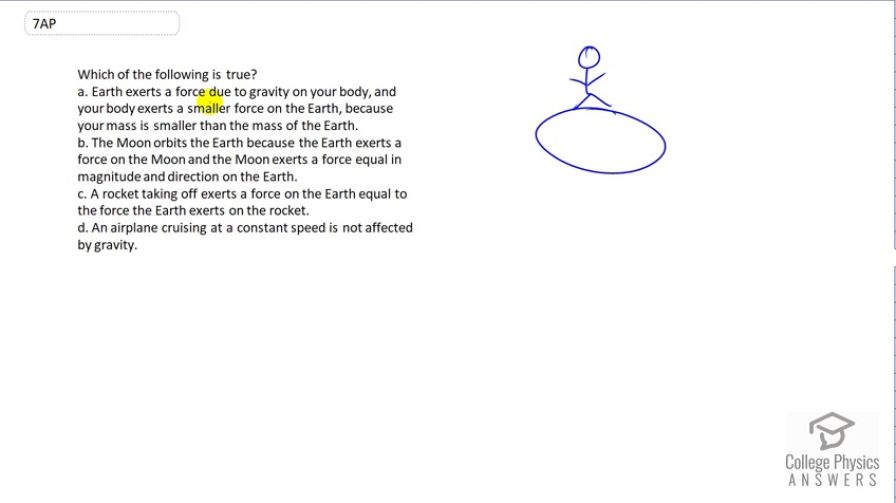Question
Which of the following is true?
-
Earth exerts a force due to gravity on your body, and
your body exerts a smaller force on the Earth, because
your mass is smaller than the mass of the Earth.
-
The Moon orbits the Earth because the Earth exerts a
force on the Moon and the Moon exerts a force equal in
magnitude and direction on the Earth.
-
A rocket taking off exerts a force on the Earth equal to
the force the Earth exerts on the rocket.
-
An airplane cruising at a constant speed is not affected
by gravity.
Final Answer
(c)
Solution video
OpenStax College Physics for AP® Courses, Chapter 4, Problem 7 (Test Prep for AP® Courses)

vote with a rating of
votes with an average rating of
.
Video Transcript
This is College Physics Answers with Shaun Dychko. So let's consider which of the following is true. We'll consider part A first. Earth exerts a force due to gravity on your body and your body exerts a smaller force on the earth because your mass is smaller than the mass of the earth. That is false, not true. You would exert a force on the earth of equal magnitude to that which the earth exerts on you because these are Newton's third law pairs these two forces. So we can have the force of gravity down on the person. This is the force on the person due to the earth and the Newton's third law counterpart to that, you can always find it by writing two subscripts on a force and then switching the subscripts around and putting a negative. So the Newton's third law pair to the force on the person due to the earth is in the opposite direction on the earth due to the person. So let's switch the subscripts around and that force will be here in the opposite direction so it would be up instead of down. This would be the force on the earth due to the person. It's of equal magnitude, opposite direction, these are Newton's third law pairs and option A contradicts the Newton's third law. Okay. The moon orbits the earth because the earth exerts a force on the moon and the moon exerts a force equal in magnitude and direction on the earth. So the part that makes this a problem is it says "equal direction" which is not true. It's in the opposite direction. It is of equal magnitude, that part's right, but since this part is wrong you can say option B is wrong. We can draw a picture of that. So here's the earth and here's the moon and here's the force on the moon due to the earth, and then finding the Newton's third law counterpart to that would mean taking, putting a negative sign and then switching the subscripts around and then write em instead. So that's the force on the earth due to the moon in the opposite direction. That's what that negative is there for. That's the issue with part B is that it suggested that the moon was exerting a force in the same direction, but it isn't. It's in the opposite direction. So this is the force on the earth due to the moon. Okay. Part C, a rocket taking off exerts a force on the earth equal to the force the earth exerts on the rocket. Now this is confusingly true because -- well, it's confusing because if you see the words that, you know, the fact that the rocket, the earth is exerting a force on the rocket equal to that of the rocket's exerting on the earth, how is the rocket taking off? Well the answer is that this force exerted by the earth is not the only force on the rocket. There is also the force applied by the gas that's being expelled out the back of the rocket. So, we have the force on the rocket due to the earth, that's downwards, and then in turn there is a force on the earth due to the rocket and they are of equal magnitude in opposite directions. Part C is a little -- you could almost say that part C is wrong, you know, it is the most right and so we're going to choose it. I mean D is clearly wrong because well, the airplane is still experiencing gravity and it just happens to have a force due to the air pushing up on its wings of equal magnitude to the gravity downwards and the gravity is still there. So, part D is wrong and part C is -- well, these forces are not technically equal because they're in opposite directions so that the fact that they're in opposite directions means they're not equal. But they are of equal magnitude. But since it doesn't use the word "magnitude" I guess we'll kind of accept it, but number C is not a very good answer but it's the best out of these four. So that's why it's the correct answer. But to expand more on what I was saying about this rocket, how does it take off, well not only is there a force on the rocket due to the earth, but because the rocket is exerting a force on all this gas to push it up, out the end here, all this propulsion gas, we could say that gas is experiencing a force on the gas due to the rocket. This gas will in turn exert a force on the rocket due to the gas. This is a very large force, much greater than the force of gravity and this is why the rocket nevertheless can take off.